The last newspaper standing
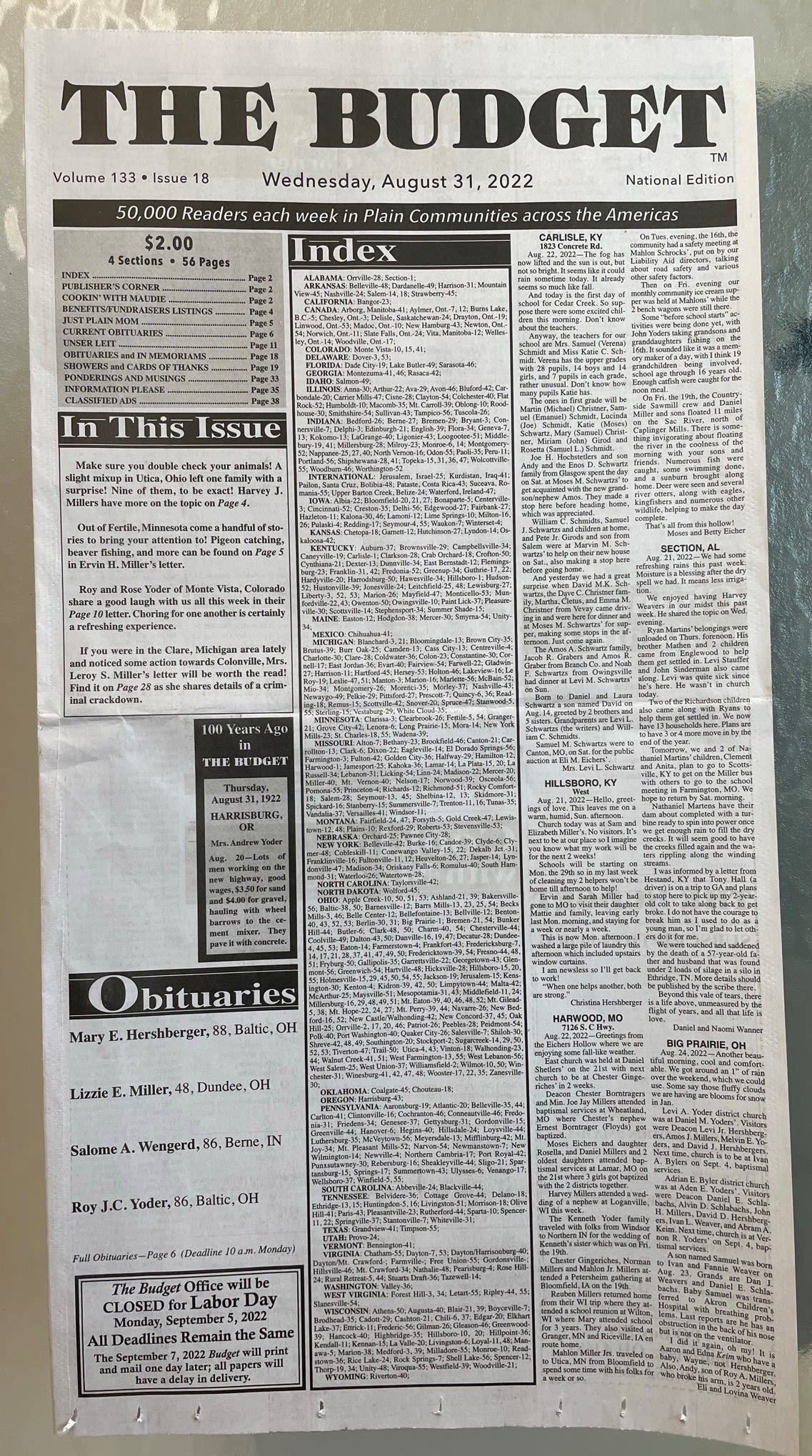
Video by Alan Miller

By Sophie LeMay
Photos by Sophie LeMay and Alan Miller
SUGARCREEK, Ohio – Of all newspapers in the U.S., The Budget is likely to be around the longest.
At 60 pages and about 20,000 copies a week, it’s one of the largest paid-circulation weekly newspapers in the country. It has no online edition. Paper only.
What’s its secret to success at a time when most newspapers are losing print circulation?
Its loyal readership: Amish and Mennonite people. The Budget is a staple on the kitchen tables of these conservative Anabaptists around the world. For some, without the use of social media, smartphones, and automated travel, the paper is a primary source of information.
Though it’s not a substitute for the “Amish telegraph” – as some call word-of-mouth news traded over a farm fence, at a livestock auction, or in a sewing circle – the paper is thriving.
For many, the newspaper serves as a source of information and entertainment, and as a weekly letter from distant friends and family. It’s so popular that when The Budget hosts public events, someone almost always asks publisher Milo Miller for his autograph.
“This is a saying we hear a lot now: They (readers) say, ‘I’m so popular! You know how popular I am? I get 700 letters in the mail each week! It’s called The Budget.’ It’s just such a tie in the community,” says Miller, 43, a Kent State University graduate who lives in Sugarcreek, Ohio, where The Budget is based.
The paper truly is a collection of letters – 1,060 volunteer “scribes” living in places such as Verdigre, Nebraska, and Resaca, Georgia, share the latest weather, updates on how crops are faring, marriages, births, deaths, and who visited recently for church.
Jason and Holly Troyer and family spent Sat. with Jesse Troyers. Jason had bought 4 garage doors for the new shop at Jesses’, so installing them was the men’s focal point while the ladies did other less intense activities.
-Rachel Miller, Crossville, TN
We’ve only had cherry tomatoes, so far, though others around are enjoying tomato sandwiches already. Maybe if I could weasel my way into my ‘tomato forest’ I might be able to find some larger ones!
-Cora Coblentz, Amesville, OH
Dan Raber considers The Budget a way for a lot of people “to keep a light touch on what’s happening with extended family without making phone calls or writing letters.
“It’s a way of having a wider connection without feeling personally obliged to step into somebody else’s space,” says Raber, owner of The Colonial Homestead hand-tool and woodworking shop on Rt. 241 between Millersburg and Mt. Hope, and the son of a Budget scribe.
Not much has changed in The Budget since its founding in 1890. The same is true for its cozy, brick-walled newspaper office on Factory Street, along railroad tracks in Sugarcreek. The office is tightly packed with desks piled with papers and clippings. The staff has given up typewriters for computers, and the paper is printed on a modern press, but the space feels – and smells – just like an old-fashioned, hometown newspaper office.
A U.S. map stretches across the back wall of the lobby and is dotted with more than 700 push pins. Milo Miller notes that the map needs some updating, but the pins mark the locations of most Budget scribes, each representing an individual settlement of 20 to 30 families. Nearly every state has at least one pin, but they are thickest in Pennsylvania, Ohio, and other parts of the Midwest.
The geographical concentration only enhances the already strong sense of community within the culture.
Saturday noon Leons, Gale Helmuths, and Elaine were at Alfreds for an outdoor dinner. I was sorry to miss them, but I was on my way home from Crossville, and they needed to leave. We passed each other on 64 and waved.
-Mrs. Henry Beachy, Belvidere, TN
We just recently got our copy of Who Is Who in The Budget, so I’ve been going through and finding out more about the people behind the scenes. Apparently, I was fortunate enough that there was a book left out of the last 150. There are at least 13 scribes in either David’s or my family that I can think of, brother, sister, uncle, nephew, and cousins, plus so many friends and acquaintances, so I consider this a connecting link through letters.
-Mrs. David Chupp, New York Mills, MN
For more than 300 years, Amish and Mennonite communities have been most heavily concentrated in Pennsylvania and the Midwest. There, early Anabaptists, the broader Christian movement that includes these groups, found religious freedom in the 17th century after fleeing persecution in Europe. These days, new settlements of “Plain People,” as they call themselves because of their austere lifestyle, are spreading to the coasts and beyond, including Canada, Iraq, Israel and Nicaragua.
The Budget offers a 10-page Local Edition in print (and a Facebook page, but no digital edition) for readers in the immediate Sugarcreek area, while the National Edition is mailed to most of its subscribers.
The National Edition generally isn’t a breaking news source. It functions more like Facebook on paper, sharing personal notes of family and friends.
Our granddaughter with Yoder’s Dystonia seems to be doing pretty good the last while. She seems stronger since they mix an egg with her milk.
-Dan and Clara Miller, Kennan, WI
Our house pet frog had a surprise this morning. It sits on the sink and catches a lot of flies. It sees a fly and creeps closer and all of a sudden jumps and it has a meal! But this time, it happened to be a wasp and the frog got a sting! Samuel quickly pulled the wasp out of the frog’s mouth and that was the end of it. We only have 1 frog in here this summer but at times we had a few and their favorite place to be was in the coffee mugs. So at times we had a surprise!
-Noah and Sarah Catherine Yoders, Humansville, MO
The Budget's founder John C. Miller, wrote that his intentions for the paper were “to give the current news and to aid in propagating any movement for the general good. … Independent in all things, we maintain the ground of neutrality, and we fearlessly publish whatever may be of interest and conducive of good morals,” according to a story in Smithsonian magazine.
While the newspaper’s content typically remains benign, it’s not without effort by the editors, who know their audience well. Milo Miller, whose father grew up Amish, was not raised within the Amish or Mennonite church, but he lives in the area and is keenly in tune with his readers.
The newspaper is owned and operated by people outside of the “plain” community. Miller says the staff is mindful of this dynamic, and they work hard to show respect to the community they serve. “It's not our paper; it's theirs,” he says.

A recent front page of The Budget displays the news of the week.
A recent front page of The Budget displays the news of the week.
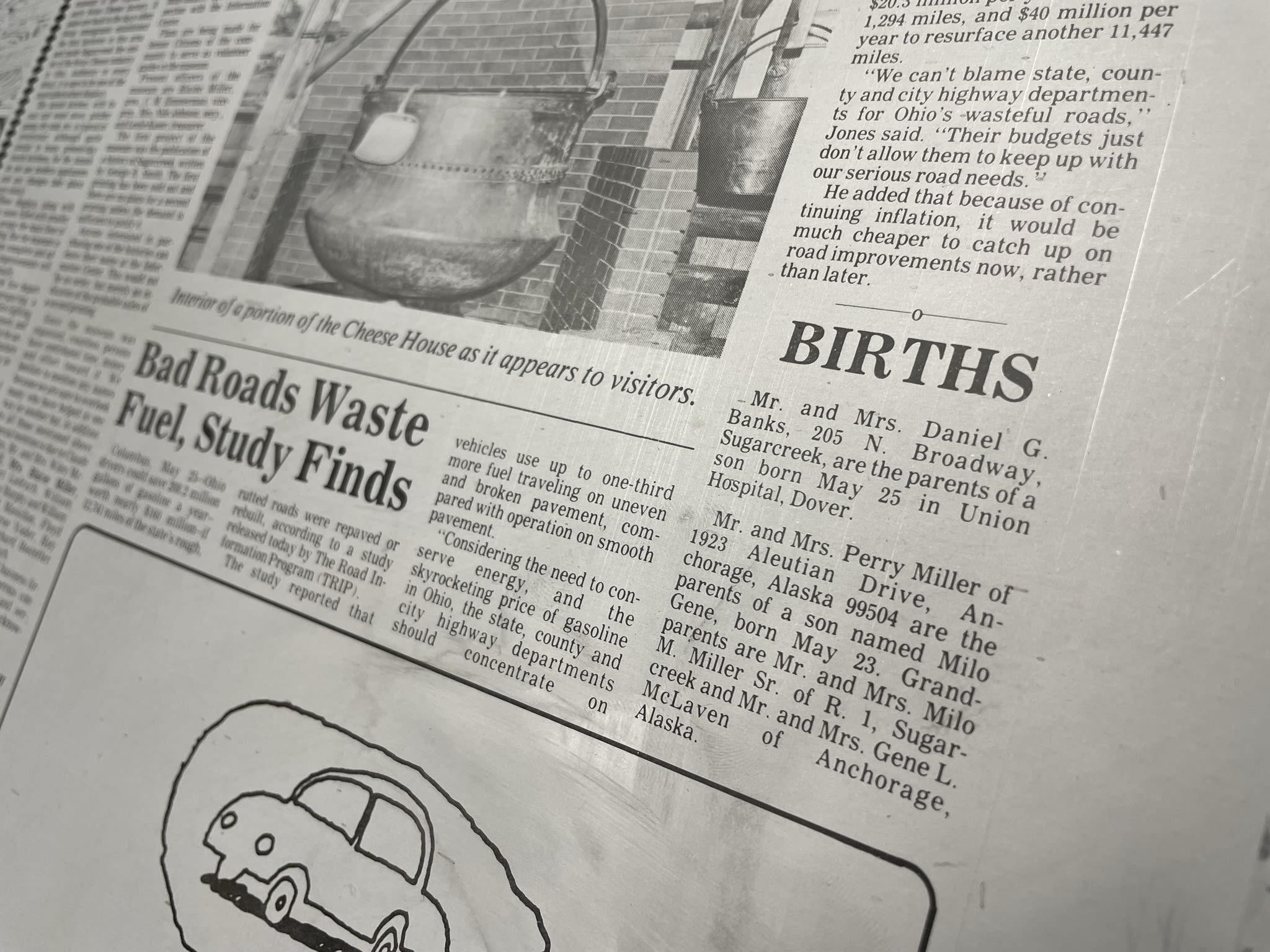
The newspaper features many announcements, including births and deaths.
The newspaper features many announcements, including births and deaths.
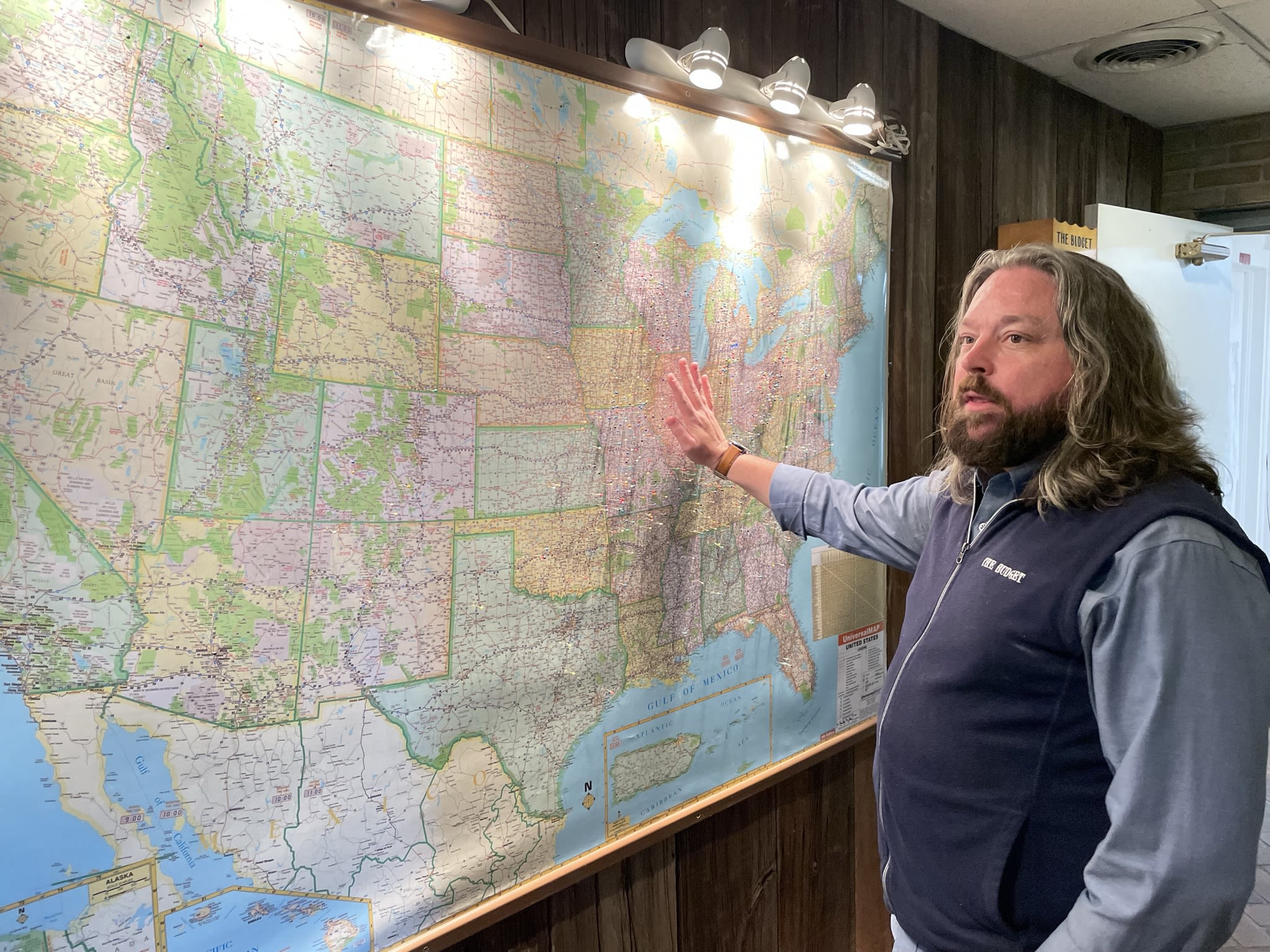
Milo Miller, publisher of The Budget, shows off where he has "scribes" across the country.
Milo Miller, publisher of The Budget, shows off where he has "scribes" across the country.
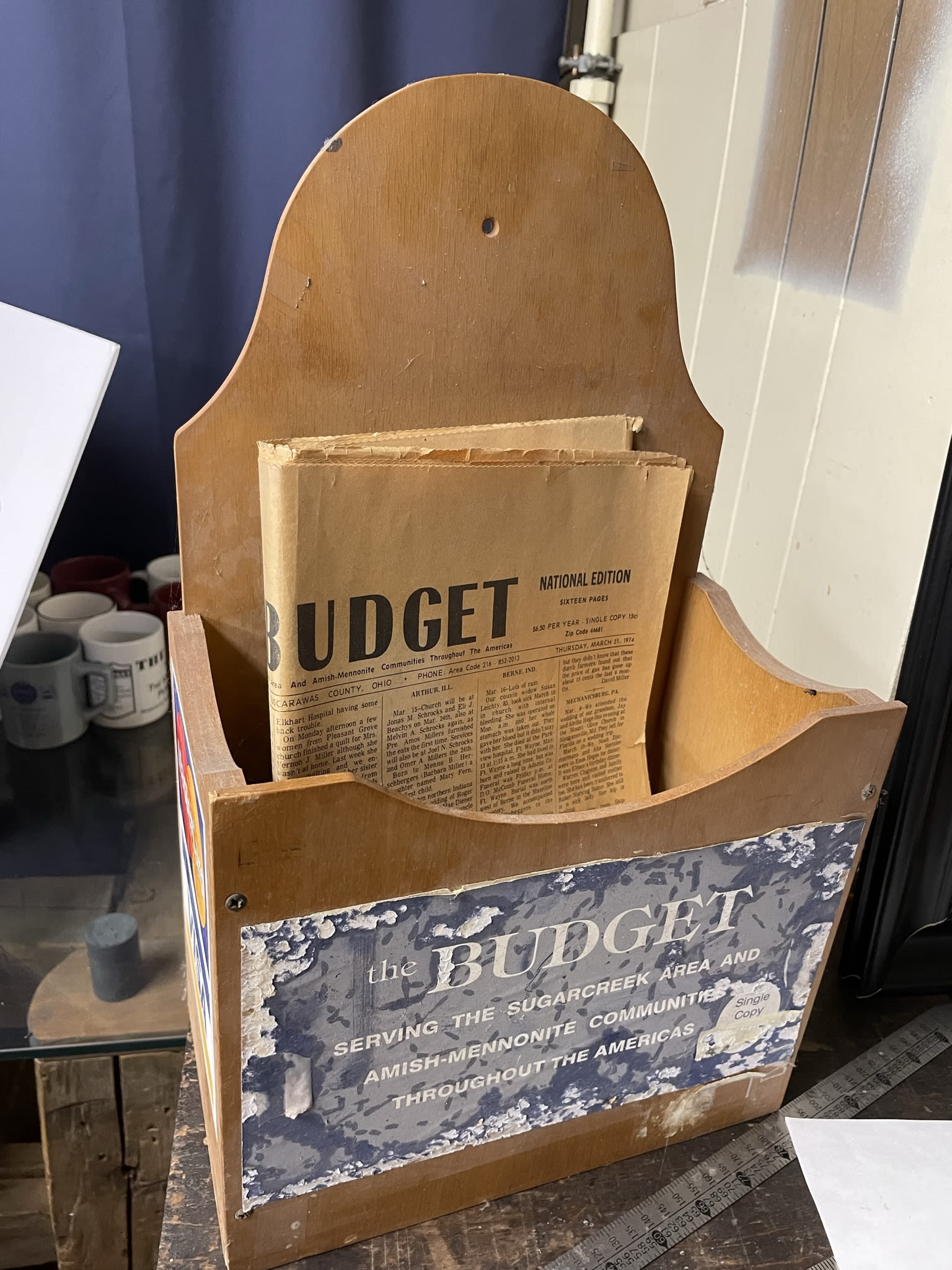
An old sales rack is among the memorabilia in The Budget office.
An old sales rack is among the memorabilia in The Budget office.
Publisher Milo Miller
The Budget's original office, circa 1912
A farm near Sugarcreek
Various supplies and reference materials
“There’s no other newspaper like it in the world. It’s so unique. It brings all these communities together."
Amish and Mennonite scribes produce the content, but Miller and others who aren’t Amish edit the paper – including sometimes removing controversial content on politics, sex, violence, drugs, and alcohol.
Nevertheless, cultural gaps inevitably occur between the writers and editors.With its conversational tone, the paper includes some of the same cultural colloquialisms as everyday small talk, which means it can range from mundane to nearly foreign to readers from outside the community.
Our church services were at Lyndon Lambrights. Visitors on the minister’s bench were Jason Stutzmans, Leonard Hochstetlers, and Loren Stutzmans. Next services to be at Marlin and Laura Miller.
-Mrs. Kenny Vera Jones, Middlebury, IN
We had our buggy horse re-shod at grandson Samuel Byler’s last week one evening. Sams and their two boys had been headed to a ball game at Toby Detweilers’ last week one evening when their horse threw a front shoe. It came in through the open front, made a ringer on Margaret’s forehead and flew on out the open half door in the back of the buggy.
-Daniel M. Yoder, Lamar, MO
“Only in The Budget can you read, ‘She is on a wheelchair going backwards,’ in a letter about someone’s health, or ‘The yard sat full of people,’” says Walnut Creek, Ohio, scribe Willis Miller with a laugh. “Pennsylvania Dutch doesn't always translate” well into English.
In recent years especially, as more and more settlements appear across the country, being a scribe for The Budget has become a position of status within a community. With access to nearly the entire Amish and Mennonite population, their words carry some weight.

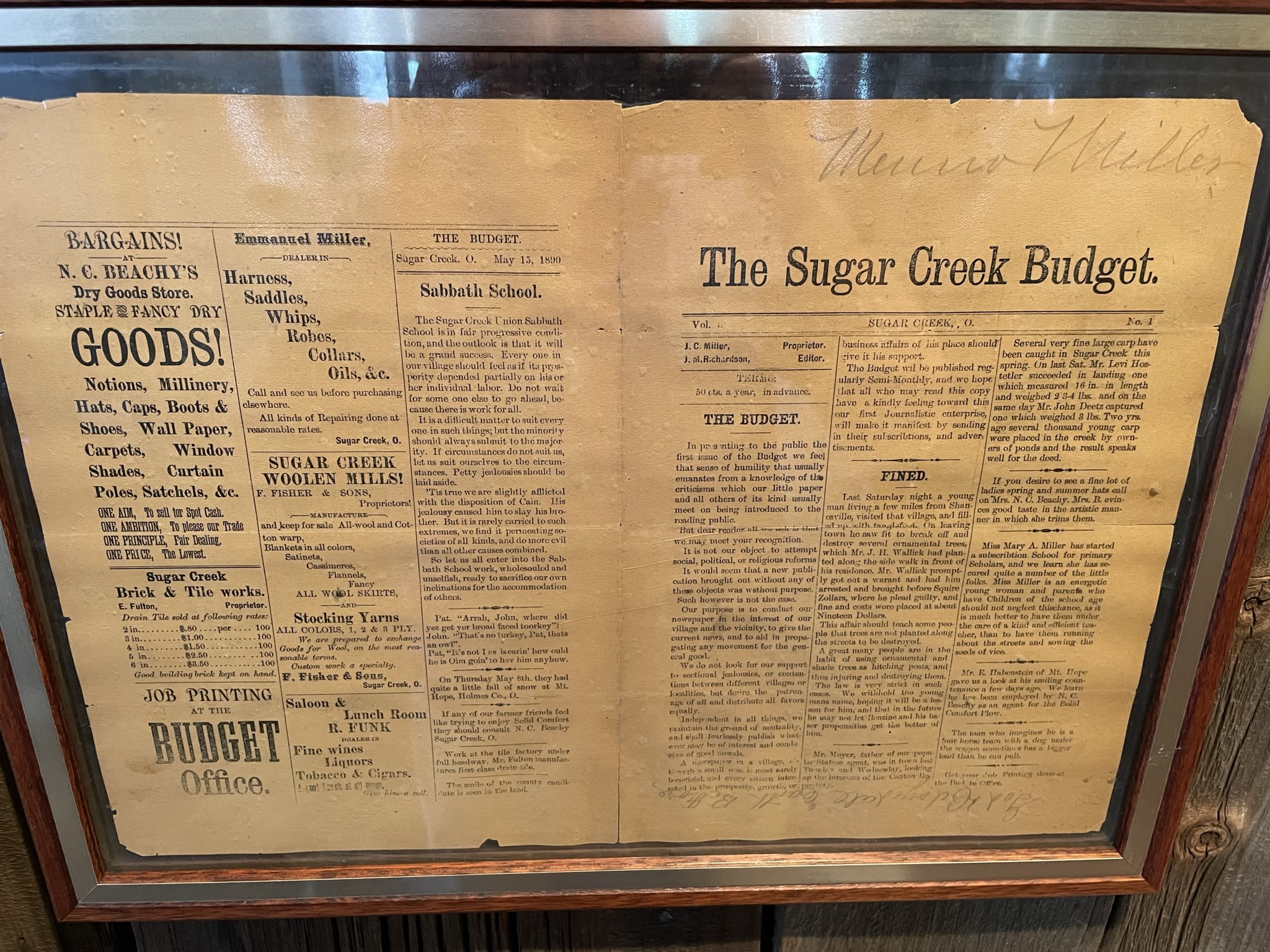
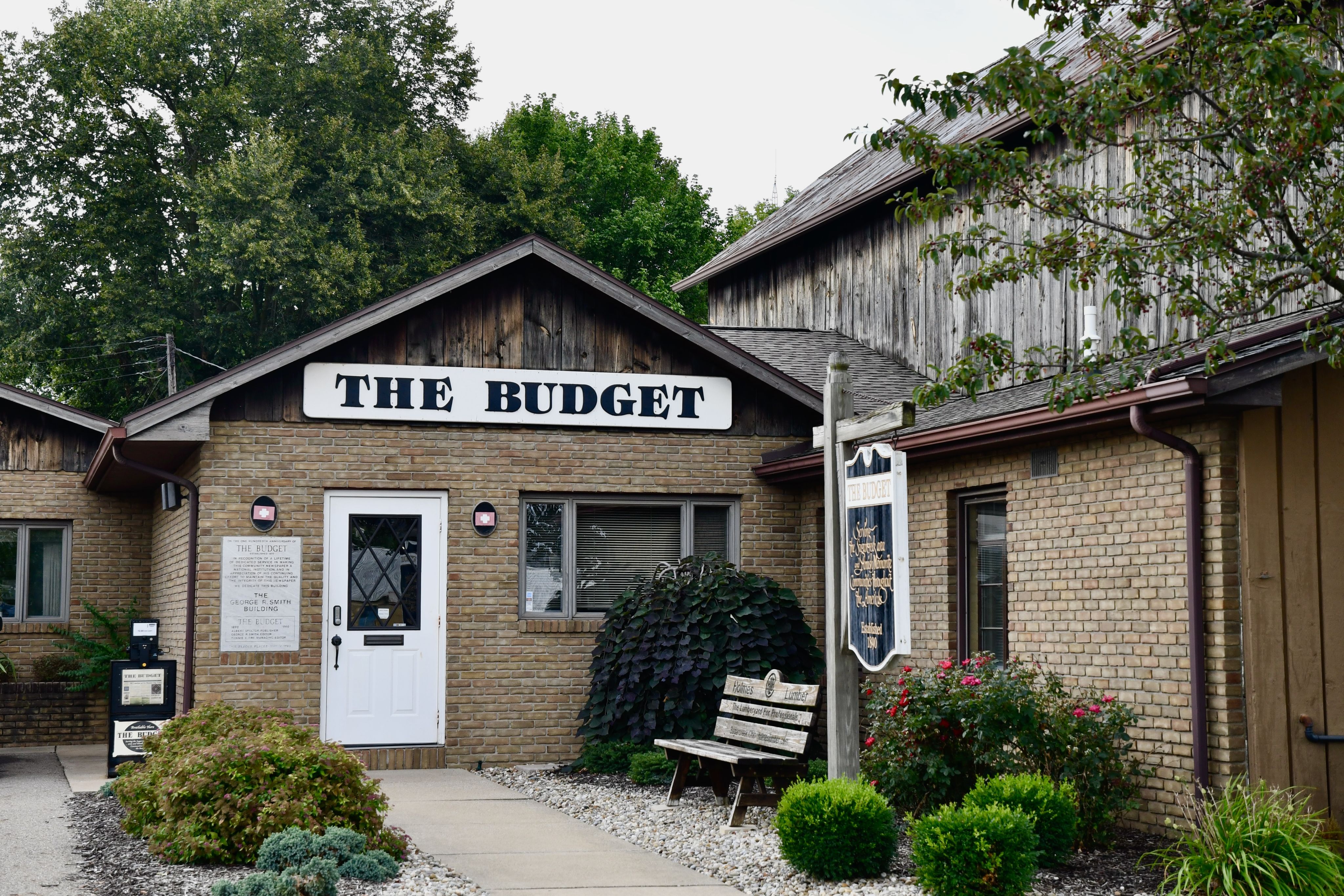





Cory Anderson is a sociologist and Holmes County resident who converted to the Anabaptist faith at age 18. In doing sociological research on the plain people, he has a unique perspective on the dynamics of the community he joined.
He notes that “the staff at The Budget are very much conscious of the ‘trash talk’ that plain people (subtly sometimes) level at each other to influence each other’s behavior. If (someone writing for) The Budget gets a little too [snippy], [editors are] going to hear about it,” he says. These days, Anderson attends a conservative Mennonite church with his wife, Jennifer, who also converted to the faith.
While The Budget is about as different from a typical newspaper as one can find, and its audience is unique, Milo Miller occasionally receives feedback similar to many newspaper editors and publishers today.
“I just never thought I would field calls of people telling me I’m part of the leftist agenda,” Milo Miller says. After all, he publishes columns such as “Cookin’ With Maudie” and “Just Plain Mom,” which chronicles such chores as dusting cobwebs over homeschool books in early August. But some have complained when they hear from a scribe that the paper edits out blatantly political and potentially polarizing content.
Aside from the occasional such complaint, most of The Budget is non-controversial. Scribes rarely spare details, and it has the feel of a comfortable conversation over a cup of coffee.
Greetings from a white house. I normally start this on Sat. evening, and then tidy it up on Mon. morning after gathering a few tidbits at church, but we had some neighbors come over Sat. evening and this did not get done then. …
-Everette D. Burkholder, Dayton, VA
A sunny hello and news from the Pequea. … The Fishers pumpkins measure 10’’ round and some 10’’ long. We offer our condolences to the carpenter John Z. Ebersol family, … as 83 year old John died last week. John was a gifted barn framer and well known carpenter in southern Lancaster Co. In his retirement he made model barns, perfectly made to scale; only thing missing was the sound of hundreds of hammers in the old time barn raisings.
-Sam Stoltzfus, Gordonville, PA
Weather is a common topic, as the communities rely on sun and rain for healthy crops and gardens. Scribes often begin their Budget letters this way.
Another sunny, warm day after our 2” of welcome rain last week. Cucumbers are just starting and lots of garden goodies again.
-Dan and Clara Miller, Kennan, WI
We are having a very welcomed rain. Farmers are making second cutting hay. Oats are ripening, but looks like a short crop.
-Alfred M. and Mary Yoder, Clark, OH
The paper’s most faithful readers are older members of the community, though readership has recently been trending younger, Milo Miller says.
“People – older people – reserve their Wednesday evenings just to read The Budget. The diehards,” says Willis Miller, the scribe from Twp. Rd. 419, just outside of Walnut Creek, Ohio, who is not related to Milo Miller.
Willis sits in his kitchen with his latest column in front of him on the dinner table. His report covers eight pages – double spaced – all in cursive longhand, neatly torn from his Budget-issued yellow, legal pad. Each Monday, his employer lets him use the fax machine in the breakroom of Hiland Wood Products to send his column to the Budget’s editors, who type his prose into a computer and ship it off for Wednesday’s paper.
“In school, when we played ball, I was almost always the last one to be chosen – I was not athletically gifted,” Willis Miller says with a laugh. “But God in his wisdom knew not to make us all alike. I love to write, I love to use words, particularly descriptive adjectives.”
It shows.
Last summer, Willis Miller wrote in the July 21, 2021, edition about a fatal crash a few miles from his home, describing a community’s grief with raw emotion.
Our community is reeling due to the July 9 bicycle/motor vehicle accident claiming the life of 20-year-old Monica Miller. Monica was on her bicycle at the intersection of St. Rt. 515 and U.S. 62, where this happened. Unbelievable being here one moment and gone the next. Does our life hang on a thread so slender? Bringing grief so raw and stark family, with her absence in the home, the youth circle, and the church family becoming so real. … Unashamedly, we shed tears and cry, being part of the healing process and acceptance. … Where would we be minus the support of family and friends with tear-stained cheeks offering words of consolation?
-Willis D. Miller, Walnut Creek, OH
Many of his peers also find joy in crafting richly detailed prose for the paper.
Nature has a way of holding our attention in different ways, certain times of the year. Now when we enter the woods in the fall, it is often stealthily, with hopes of observing whitetails, and maybe bagging one. A few months later our focus shifts to all maple, as we tap trees and boil maple syrup. Now our eyes feast on those thorn patches, and all the little ripe berries-black raspberries.
-Tobie C. Yoders, De Graff, OH
These simple letters contribute to a sense of community. The strong Christian faith within Amish and Mennonite groups is at the core of the bond between distant settlements, and The Budget provides another layer of glue to hold communities together.
“There’s no other newspaper like it in the world. It’s so unique. It brings all these communities together,” says Willis Miller.
Having been publisher for nearly two decades, Milo Miller has seen the newspaper grow despite the pressures on other modern newspapers.
A recent Washington Post story said, “Newspaper companies have been struggling to find their financial footing with the decline of print advertising. A recent Northwestern University study predicted that one-third of American newspapers that existed roughly two decades ago will go extinct by 2025.
Newspapering is surely a changing industry. But Milo’s confidence in The Budget doesn’t waver, and for good reason.
“I honestly think, and it’s nothing I’ve done, this will be the last newspaper standing,” he says.
Sophie LeMay writes for TheReportingProject.org, a nonprofit news organization of the Denison University Journalism Program, which is funded in part by the Mellon Foundation.
